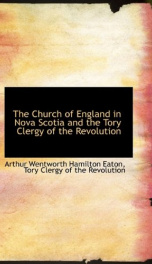the church of england in nova scotia and the tory clergy of the revolution

Purchase of this book includes free trial access to www.million-books.com where you can read more than a million books for free. This is an OCR edition with typos. Excerpt from book: CHAPTER III. THE CHURCH ESTABLISHED. In 1758 the first assembly of the province met, and the question of religion was of course one of the first to be considered. This assembly was composed of nineteen members, six of whom ranked as esquires, thirteen as gentlemen. A large proportion of them were men born in Great Britain, a few were of Puritan stock, born in the New England colonies, and one at least was of German origin. When we remember that three years before, the provincial authorities, seconded by the home government, had resorted to the extreme measure of the expulsion of the Acadians, and that that step had been made necessary, as was thought, by the active and long-continued hostility of Roman Catholic priests to English and Protestant rule, we shall not be surprised to find the first act regarding religion passed in the province, an act not only for the establishment of religion, but also f or the suppression of Popery. From such an assembly, however, as that convened inHalifax in 1758, representing a population already considerably differing in faith, and now beginning to look toward Congregational New England for settlers for the lands of the exiled Acadians and for the enlargement of the trading and fishing settlements on the western shores, we shall not expect rigid laws in favor of the Church of England. The day for uniformity acts in the colonies, such as had been passed in Virginia in 1631-32, and in Maryland seventy years later, had now gone by, and toleration of Dissent was recognized, not only as expedient, but as the undoubted right of Dissenters themselves. Consequently, while the provisions of the act of this Nova Scotia Assembly are severe against Roman Catholics, they are correspondingly lenient toward all Protestant Dissenters of whatever name.... --This text refers to the Paperback edition.
Info about the book
Author:
Series:
Unknown
ISBN:
1554780675
Rating:
3/5 (4)Your rating:
0/5
Languge:
English
Users who have this book
Users who want this book
What readers are saying
What do you think? Write your own comment on this book!
write a commentGenre
if you like the church of england in nova scotia and the tory clergy of the revolution try:
Other books by this author
Do you want to read a book that interests you? It’s EASY!
Create an account and send a request for reading to other users on the Webpage of the book!


